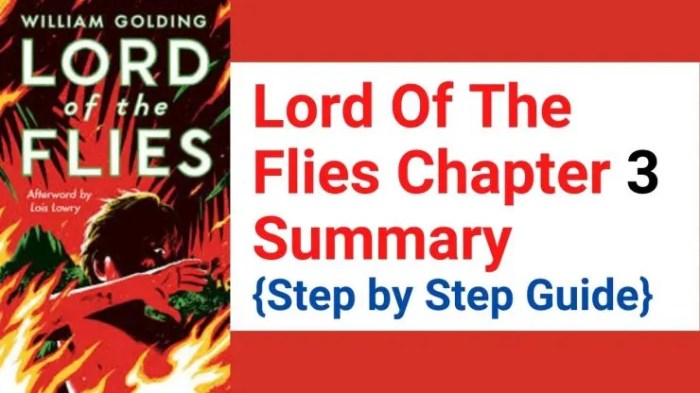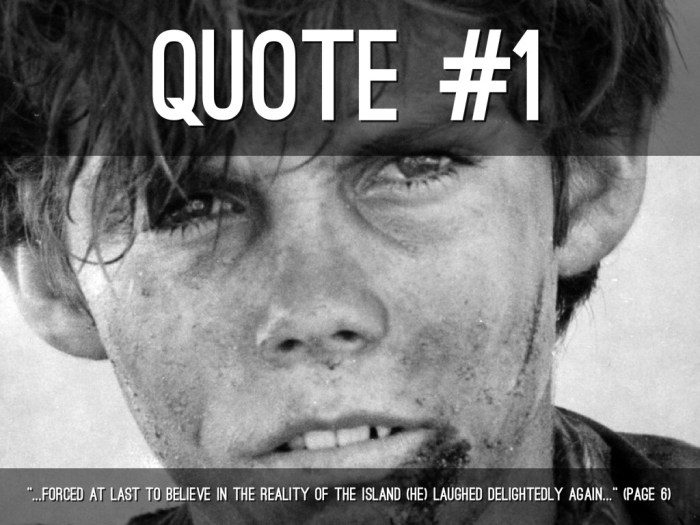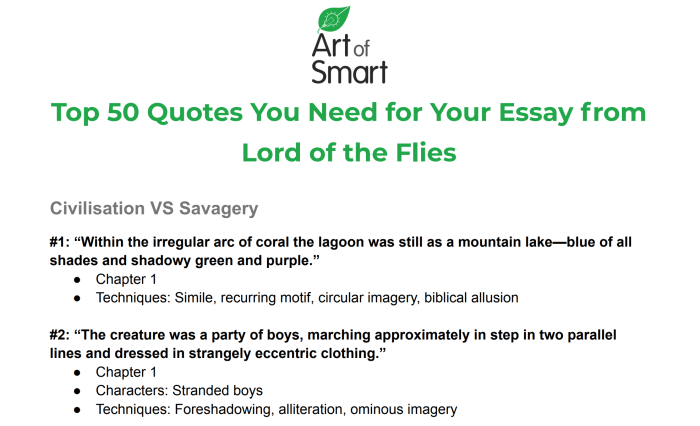Quotes from Lord of the Flies Chapter 3 lay the groundwork for this captivating narrative, offering readers a glimpse into a story that is rich in detail and brimming with originality from the outset.
This chapter introduces a diverse cast of characters, each with their unique motivations and desires. The interplay between these characters drives the plot forward, as they struggle to establish order and maintain civilization on a remote island.
Chapter 3 Analysis: Lord of the Flies: Quotes From Lord Of The Flies Chapter 3

Chapter 3 of Lord of the Flies introduces a group of British boys who have been stranded on a deserted island after a plane crash. The chapter focuses on the establishment of a society among the boys and the emergence of conflicts between different factions.
Character Analysis
The chapter introduces several key characters:
- Ralph: The elected leader of the boys, representing civilization and order.
- Jack: The leader of the hunters, representing savagery and primal instincts.
- Piggy: An intelligent and overweight boy, representing reason and logic.
The relationships between these characters are complex and drive the plot of the chapter. Ralph and Jack initially work together, but their different personalities and motivations lead to conflicts. Piggy, as the voice of reason, often tries to mediate between the two but is often ignored.
Setting and Atmosphere, Quotes from lord of the flies chapter 3
The setting of Chapter 3 is a deserted island, which contributes to the atmosphere of isolation and danger. The island’s lush vegetation and abundant resources provide a sense of abundance, while the lack of adult supervision creates a sense of freedom and lawlessness.The
island’s natural features, such as the beach, the jungle, and the mountain, become symbolic of different aspects of the boys’ experiences. The beach represents civilization and order, while the jungle represents savagery and chaos.
Themes and Motifs
- The struggle between civilization and savagery: The boys’ initial attempts to establish a society are undermined by their primal instincts and desire for power.
- The loss of innocence: As the boys spend more time on the island, they gradually lose their sense of morality and become more savage.
- The fear of the unknown: The boys are constantly haunted by the fear of the “beast” that they believe inhabits the island, which symbolizes their own inner fears and anxieties.
Literary Devices
Golding uses a variety of literary devices in Chapter 3 to enhance the reader’s understanding of the characters and plot. These include:
- Metaphors: The island is described as a “microcosm” of the world, representing the larger conflicts between civilization and savagery.
- Similes: The boys are compared to “savages” and “animals,” highlighting their loss of humanity.
- Foreshadowing: The chapter contains several instances of foreshadowing, hinting at the dark events that will unfold later in the novel.
Quotations and their Significance
| Quotation | Significance |
|---|---|
| “The world, that understandable and lawful world, was slipping away.” | This quotation foreshadows the boys’ descent into savagery and the loss of civilization. |
| “The conch exploded into a thousand white fragments and ceased to exist.” | This quotation symbolizes the end of order and the triumph of savagery on the island. |
| “Life was a game that one played according to the rules.” | This quotation represents Ralph’s belief in civilization and order, which is gradually eroded throughout the chapter. |
FAQ Compilation
What is the significance of the conch shell in Chapter 3?
The conch shell symbolizes order and civilization. It is used to call meetings and to ensure that everyone has a chance to speak.
How does the conflict between Ralph and Jack foreshadow the events to come?
The conflict between Ralph and Jack foreshadows the eventual division of the group into two factions: those who want to maintain order and those who want to embrace savagery.

